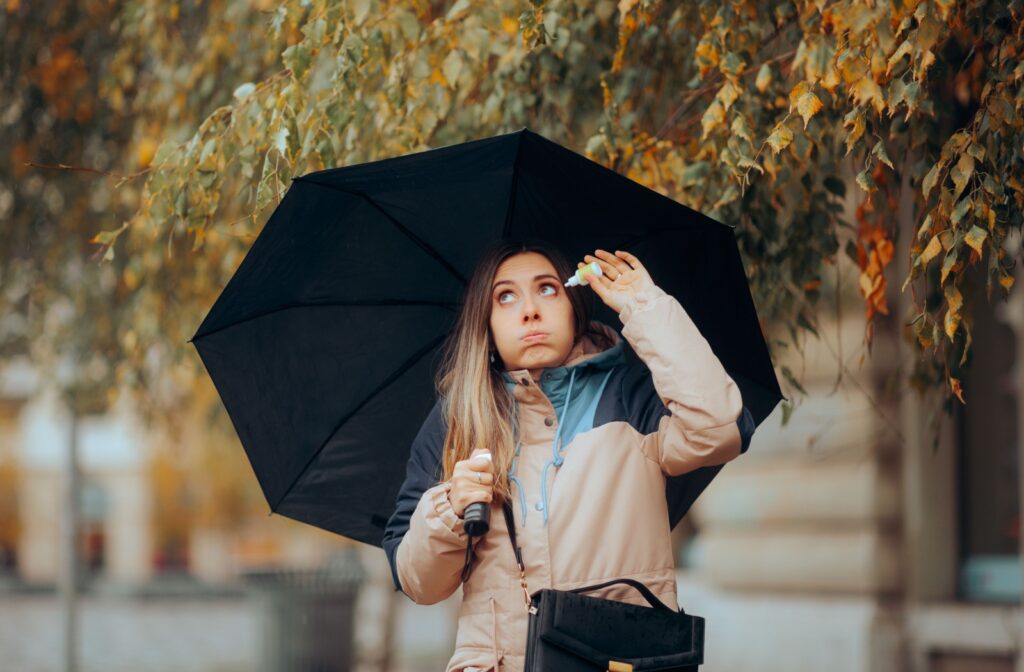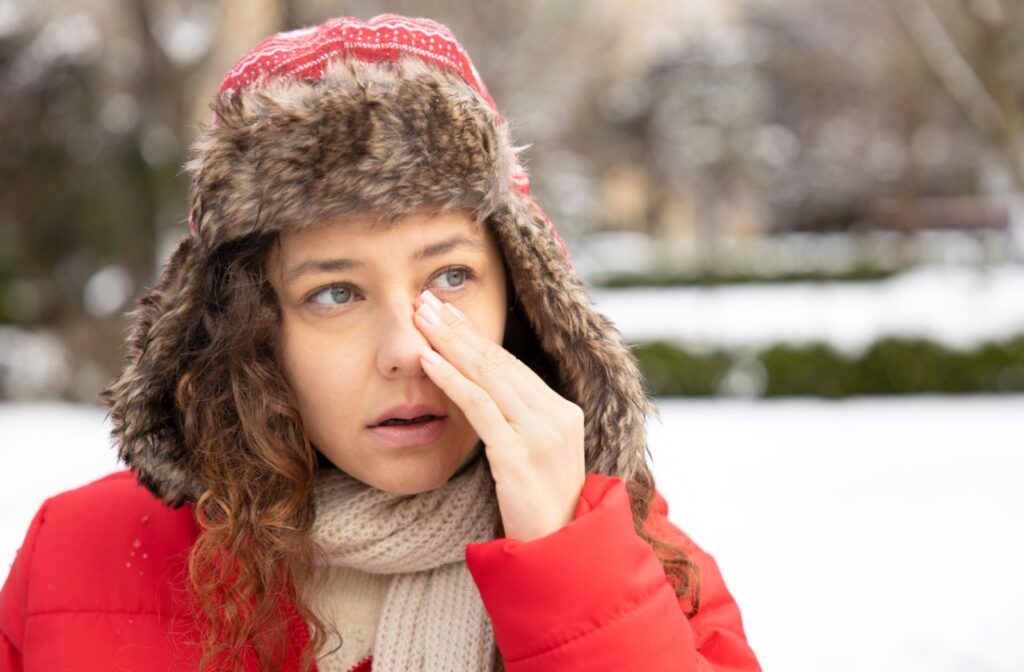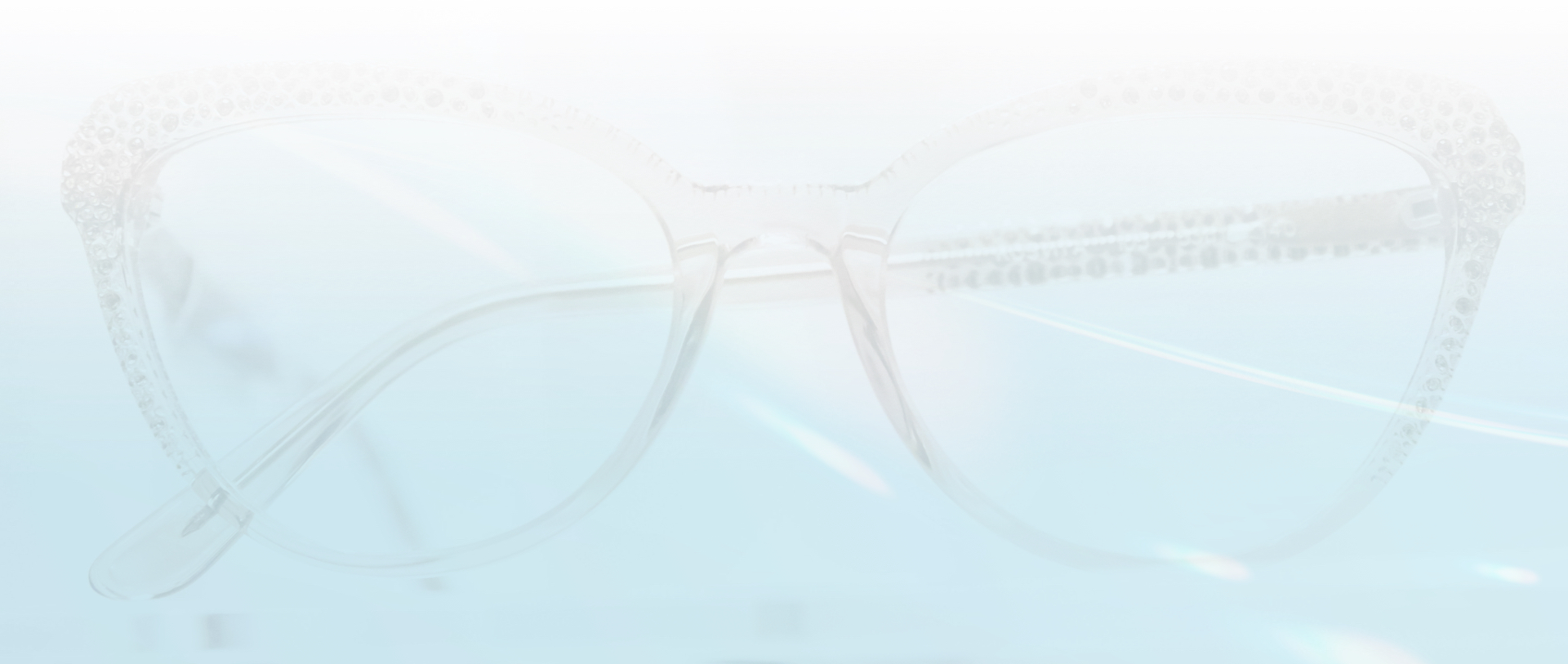As temperatures drop and winter sets in, many people experience a common phenomenon of watery eyes in the cold. This issue can be quite uncomfortable and may even impair vision for some individuals, making outdoor activities less enjoyable.
The most common causes of watery eyes in chilly conditions include excessive tear production due to cold air, windy weather that irritates the eyes, allergies triggered by indoor allergens, and dry eyes resulting from low humidity levels. Understanding these factors can help individuals take measures to alleviate watery eyes and maintain clear vision during the colder months.
Excessive Tear Production
One of the primary reasons that people develop watery eyes in cold weather is because of excessive tear production. When we’re exposed to cold temperatures, our body’s natural response is to produce tears to keep our eyes lubricated and protect them from potential irritants. This mechanism is similar to what we experience when we have allergies; our body produces more tears to flush out any foreign particles.
However, if you find yourself constantly tearing up in the cold without any other apparent cause, it may be due to a condition called reflex tearing. Reflex tearing results from an overstimulation of the nerves that control tear production, resulting in an excess of tears. This can happen in colder temperatures due to the body’s natural response to such weather, thereby causing watery eyes.
Windy Weather
Another common cause of watery eyes in the cold is windy weather. When air blows into our eyes, it can irritate and dry them out, causing our tear ducts to produce more tears to keep the eye lubricated and protected. The wind can also carry dust, allergens, or other foreign particles that can further irritate the eye and trigger excessive tearing.
Those who wear contact lenses may be more susceptible to such issues, as contacts can trap debris between the lens and the eye. If you experience watery eyes in the cold while wearing contacts, consider switching to glasses or using lubricating eye drops to help alleviate the symptoms.
Allergies
For some individuals, watery eyes in the cold may be a result of allergies. Cold weather can cause an increase in allergens such as mold and pollen. When these allergens come into contact with our eyes, they can trigger an allergic reaction, which can lead—in turn—to excessive tearing.
If you have known allergies and experience watery eyes in the cold, it may be beneficial to take an antihistamine or use allergy eye drops before going outside. This will help reduce your histamine response and alleviate symptoms like watery eyes.
Dry Eyes
Ironically, cold weather can also cause dry eyes, leading to excessive tearing. When our eyes get too dry, they may produce more tears to try and compensate for the lack of moisture. This can occur in colder temperatures due to a decrease in humidity levels, both outside and indoors.
Additionally, when we’re exposed to cold air, our body’s natural response is to constrict blood vessels, which can reduce tear production. This leads to dryness and irritation in the eye, causing them to water as a protective mechanism.
If you frequently experience watery eyes in the cold due to dryness, consider using artificial tears to keep the eyes lubricated and hydrated. Wearing sunglasses or a hat with a brim can also help to shield your eyes from the dry, cold air.
Tips for Dealing with Watery Eyes in the Cold

Here are some ways to alleviate watery eyes in the cold:
Wear Protective Eyewear
If you know you’ll be spending time outside in cold and windy weather, consider wearing protective eyewear such as sunglasses or goggles. These aids can shield your eyes from harsh winds and help prevent excessive tearing.
Keep Your Eyes Moisturized
To combat dryness and irritation, use artificial tears to keep your eyes lubricated. You can also try using a warm compress to soothe any discomfort caused by excessive tearing.
Avoid Rubbing Your Eyes
While it may be tempting to rub your eyes when they’re watery and irritated, this can actually make things worse. Rubbing your eyes can further irritate them and potentially introduce more irritants.
Consult with an Eye Doctor
If you experience frequent or persistent watery eyes in the cold, it is best to consult with an eye doctor. They can determine where there might be an underlying issue causing your excessive tearing, in which case they’ll be able to provide treatment.
Essential Eye Care at McCauley Celin Eyecare
While watery eyes can be uncomfortable, they’re one of our body’s natural defense mechanisms. By understanding why they happen and implementing some simple tips, we can effectively manage any discomfort and protect our eyes from potential harm.At McCauley Celin Eyecare, we offer comprehensive eye exams and personalized treatment options for all your eye care needs. Contact us today to schedule an appointment and keep your eyes healthy and comfortable in any weather.














